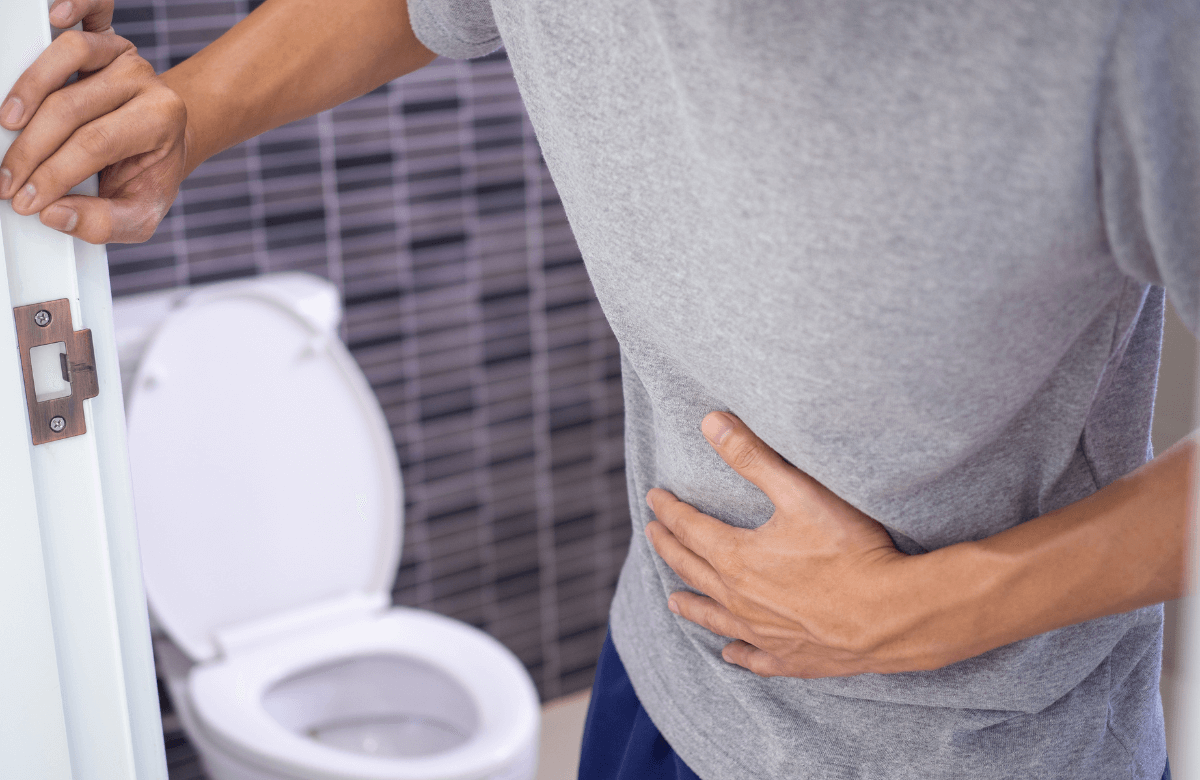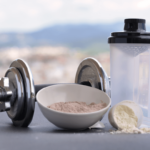Adding a tub of pre-workout to your pantry is a significant step on your fitness journey. These products are loved by the fitness community for their ability to improve concentration, endurance, and training performance.
But one thing that gets swept under the rug is that a scoop of pre-workout can sometimes create a bathroom emergency.
There’s nothing unusual about needing to use the restroom after consuming a scoop unless it’s accompanied by diarrhea, cramps, nausea, and abdominal pain.
So, why does pre-workout make you poop? When should you be concerned, and how can you avoid frequent trips to the bathroom? We cover everything you need to know to avoid the dreaded post-scoop poop in the article below.
Jump to:
Why Does Pre-Workout Make You Poop?
So, what’s the culprit behind the dreaded pre-workout poop? The truth is there are several factors that can lead to an upset stomach after drinking a pre-workout shake.
Most products contain a variety of ingredients that can lead to digestive issues, like caffeine, magnesium, and sodium bicarbonate.
- Certain ingredients
- Consuming pre-workout supplements on an empty stomach
- Too large of a dosage
- The timing
- Large doses of caffeine
- How much water you used
Other factors, like when you consumed the pre-workout supplement, how much water you used, and when you last had a meal, can also contribute to digestive discomfort.
Is This Normal?
Unless you can’t reach the bathroom in time, post-scoop poops may not be a problem.
Pre-workout powders and drinks contain ingredients that can cause gastrointestinal distress, like caffeine, magnesium, and artificial sweeteners. You may need to use the restroom shortly after consuming them, depending on the timing, when you last ate, and the dosage.
That said, you’ll need to contact your doctor if you experience abnormal pain, frequent diarrhea, nausea, or vomiting. Severe side effects can be a sign of allergies, sensitivities, or other complications. It’s best to stop taking the product immediately until you determine the cause of the problem.
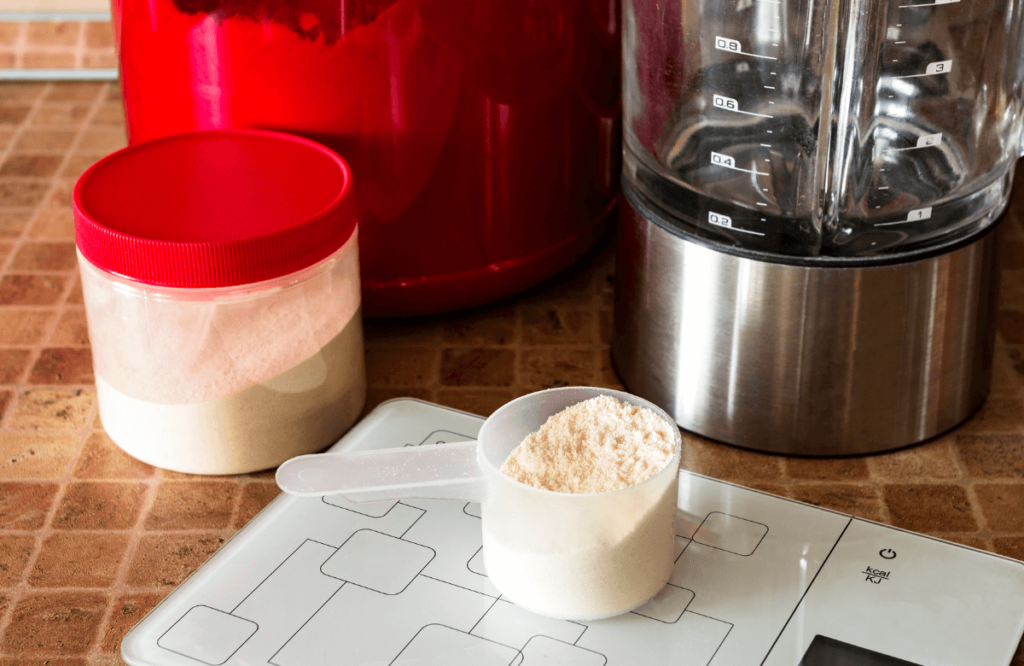
Common Pre-Workout Ingredients That Can Affect the Stomach
Pre-workout formulas contain several ingredients to increase exercise performance, energy levels, and concentration. These compounds help you get the most out of your training sessions and reach fitness goals but can lead to bowel issues.
Stomach discomfort from pre-workout powder is more common if you’re not accustomed to the blend or have higher sensitivities.
Caffeine
Caffeine is a key ingredient in many pre-workout formulas. The effects of caffeine provide you with an energy boost, higher mental performance, and enhanced athletic performance.
Several studies have found caffeine to increase muscle endurance, muscle strength, anaerobic power, and aerobic endurance.
But, just like a cup of coffee, the caffeine content in pre-workout drinks can increase bowel movement. This is because caffeine stimulates colon contractions and increases pressure downstairs, causing the urge to hit the restroom.
Pre-workout supplements can have large doses, with 150-250 milligrams of caffeine per scoop. For comparison, the average cup of coffee contains around 95 milligrams of caffeine.
Sodium Bicarbonate
Another common ingredient in pre-workout supps is sodium bicarbonate for its ability to increase muscular endurance and performance during exercise.
To put it simply, your muscles demand more oxygen than is available during high-intensity exercise. As a result, the muscles use a different pathway to produce energy, which produces more hydrogen.
The large amounts of hydrogen in the muscles decrease the pH, creating an acidic environment and the “burning” sensation you feel. The sodium bicarbonate helps you maintain proper pH levels, helping with endurance and time to exhaustion.
But large doses can cause adverse symptoms, like stomach issues, nausea, diarrhea, abdominal pain, and vomiting. Most pre-workout supplements don’t contain high enough doses, but sensitivity varies from person to person.
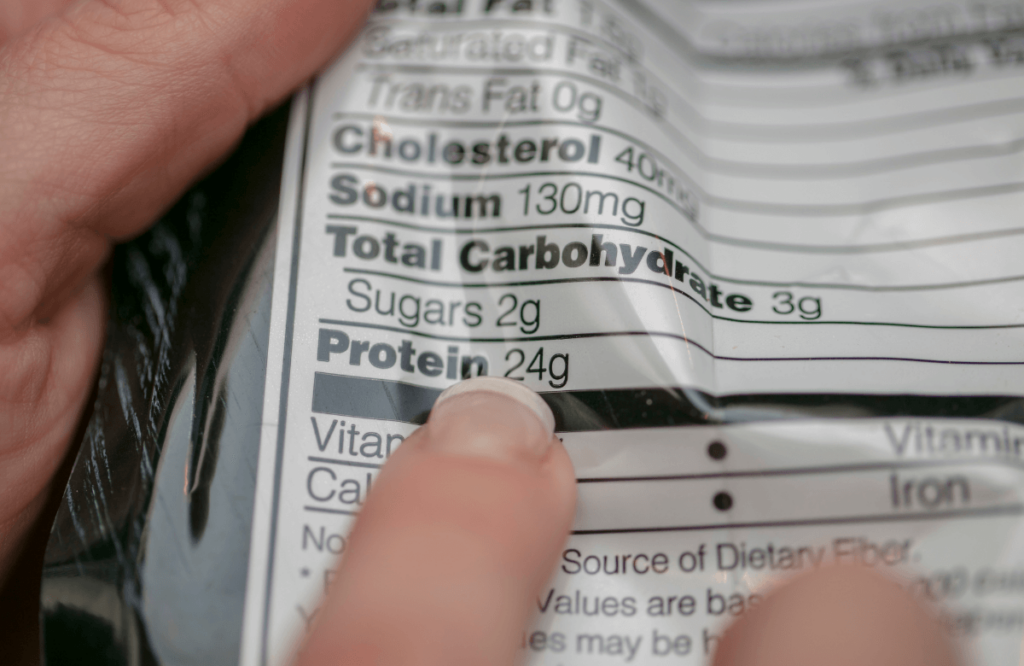
Magnesium
Magnesium is another culprit behind pre-workout diarrhea. Large doses of magnesium supplements—especially magnesium citrate—have a natural laxative effect. Magnesium is an essential trace mineral that may improve athletic performance, muscle mass, and power.
But a large amount of magnesium can increase the amount of water in the digestive tract, increasing the frequency of bowel movements. The effects will depend on the type of magnesium and your sensitivity.
Artificial Sweeteners
Many pre-workout drinks have unique flavors like strawberry kiwi, cotton candy, mango pineapple, and more. Many supplement companies use artificial sweeteners like sucralose or aspartame to liven up their blends.
Fake sweeteners can cause potential side effects, like headaches, stomach discomfort, gas, and abnormal bowel movements.
The effects of artificial sweeteners will depend on the quality, type, and sensitivity of the ingredients.
Vitamins and Minerals
Most pre-workout formulas will include micronutrients like vitamins, minerals, and even herbal extracts. Ingredients like Vitamin C and B can be beneficial for your immunity, cardiovascular health, mood, and overall performance.
However, some ingredients, like vitamin C, can have a laxative effect in high doses. Other individuals can be sensitive to vitamins and minerals, resulting in abdominal pain and bathroom trips.
These issues can be exasperated if you take a multivitamin that contains overlapping ingredients. Always inspect your pre-workout blend and other supplements for overlapping ingredients and adjust accordingly.

Other Factors That Cause Post-Scoop Poop
Besides ingredients like caffeine and magnesium, other factors like when you take the supplement and when you last ate can affect your bowel activity.
Timing
The time you consume your supplement blend will impact how your body reacts to it. If you have an intense workout session in the morning without anything to eat, the supplement is likely to take effect much faster.
If you’re using a product with caffeine, you might feel the urge to hit the bathroom within four minutes of drinking it.
Likewise, if you consume your pre-workout shake later in the day, you might not feel as strong of an urge to use the bathroom. This could be because you have food in your stomach, allowing the product to take a longer time to kick in.
Dosage
The amount of pre-workout powder you consume will also affect the severity of any digestive issues.
Several factors can impact the proper dosage for your body, including the ingredients, familiarity with the product, and your tolerance to caffeine.
If you’re new to pre-workout or a specific product, you might notice more bowel activity. You might also see digestive issues if you’re not used to the effects of caffeine.
Empty Stomach
The effects of workout supplements are typically more intense on an empty stomach. The stimulants, vitamins, and ingredients can kick in much faster, resulting in unwanted side effects.
Additionally, dry-scooping or not using enough liquid can lead to stomach issues, nausea, abdominal pain, and diarrhea.
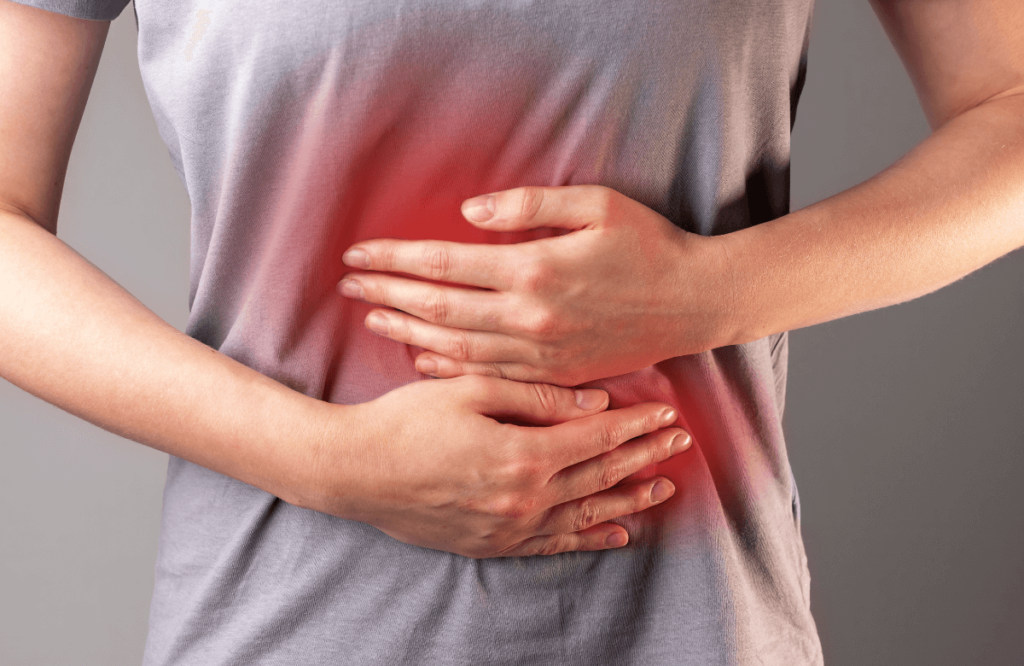
How to Get Rid of Pre-Workout Poops
The ingredients, dosage, timing, and what’s in your stomach affect how you’ll feel after consuming a pre-workout drink. It may seem a bit daunting, but here are some tips you can use to minimize trips to the bathroom before hitting the gym.
Go Stim-Free or Low Caffeine
Caffeine has several performance benefits and provides a much-needed boost of energy—but it’s the most likely culprit behind the post-scoop poop.
If you experience bowel trouble, stomach issues, nausea, or jitters, it’s probably time to swap to a stimulant-free pre-workout.
Non-stimulant pre-workout doesn’t contain any caffeine, so you’re less likely to rush to the bathroom mid-workout. If you still want a bit of caffeine, you can switch to low-caffeine alternatives.
These products tend to include anywhere between 50–150 mg of caffeine per serving. This is much less than typical blends containing over 200 mg per serving.
Eat Beforehand
Consuming workout supplements on an empty stomach can make them kick in faster and amplify the effects, especially if you’re consuming large amounts of caffeine. Eating 30–120 minutes beforehand can resolve digestive issues and provide you with the energy to hit the gym.
It’s best to eat a mixture of carbs, proteins, and fats before training.
Meals like Greek yogurt, fruit, whole grains, and lean protein may help with digesting supplements. Just remember that the sooner you eat before training, the smaller and simpler the meal should be.
Mix With Water
It’s critical to mix pre-workout powder with water or liquid. Not only can dry-scooping be dangerous for your health, but it’s also more likely to cause an urgent bathroom visit. Too little water with high concentrations of vitamins and additives may lead to diarrhea.
Instead, mix your blend with 8–12 oz of water or follow the manufacturer’s instructions. It’s recommended to sip water throughout your training session as well. This will keep you hydrated and help reduce the chance of digestive discomfort.
Adjust Your Dosage
In some cases, the dosage can lead to nausea, abnormal bowel activity, cramps, and discomfort. Many pre-workout products have a recommended serving size of one to two scoops, but this may not be ideal for everyone.
The various ingredients, additives, caffeine quantities, and flavorings may affect you more than the average person.
It’s best to take half a serving size if you’re new to pre-workouts or a specific product.

This will help you gauge the effects on your body and if it’s right for you. If you do notice any stomach discomfort, scale back on your serving and see how you feel.
You might need a bit more time to get accustomed to the product and the ingredients. Once you get used to a lower dosage, you can increase it to see if it still causes discomfort.
Avoid Overlapping Ingredients
Pre-workout formulas contain several ingredients that can be found in multivitamins and other workout supplements. Large doses of vitamins, minerals, and supplements may cause sudden trips to the bathroom.
Always inspect the ingredients on pre-workout blends. If you’re taking a multivitamin with magnesium, it may be wise to use a different pre-workout.
The same goes for caffeine. If you’re drinking large amounts of coffee or energy drinks throughout the day, look for a stimulant-free blend. Avoiding overlapping ingredients will help you avoid adverse side effects and negative interactions.
Avoid Artificial Sweeteners and Specific Ingredients
As mentioned earlier, many pre-workout blends contain artificial sweeteners and sugar alcohols, including the following:
- Sucralose
- Acesulfame-K
- Aspartame
- Erythritol
- Maltitol
- Sorbitol
Combinations of these additives aren’t typically disclosed, but many products use quite a bit to create a pleasing taste. Large amounts of these ingredients can lead to diarrhea, nausea, and general discomfort, as they aren’t easy to absorb.
It’s best to look out for these ingredients and limit the amounts of artificial sweeteners you’re consuming.
Avoid any ingredients that you’re allergic to or sensitive to, as these can cause digestive issues and unwanted trips to the bathroom as well.
Look For High-Quality Products
As you know, not all pre-workout formulas are created equally. Supplement manufacturers don’t have established safety or testing guidelines in the United States. This freedom allows brands to use ingredients that may not be very good, safe, or effective.
To avoid unsavory products, purchase third-party tested pre-workout formulas. Some reputable testing and label verification agencies include the following:
- NSF Certified for Sport
- Informed Choice
- Banned Substances Control Group
- Consumer Lab
- US Pharmacopeia
- Aegis Shield
These resources will help you determine if a product is made by responsible manufacturers. You can use the NSF Certified for Sport website for a complete list of products without harmful levels of contaminants, prohibited additives, or masking agents.

Switch Pre – Workouts
If you’ve tried some of the solutions above and you’re still experiencing gastrointestinal discomfort, it may be time to switch products completely.
The product may contain ingredients you’re sensitive to, be of low quality, or may even be expired. It may be something as small as too much caffeine or artificial sweeteners, which you can avoid in the next batch.
It’s best to inspect the label before tossing the tub out to look for any ingredients that might be causing post-scoop poops.
When you purchase another product, look for third-party testing, transparent ingredient lists, and effective dosage ranges. Adjust the dosage when you first take the product to see how your body responds and make necessary changes.
If issues persist, it’s best to consult with your primary healthcare provider to see if you have any allergies, sensitivities, or health concerns.
What Can I Take Besides Pre-Workout?
If pre-workout doesn’t sit right in your stomach despite your best efforts, it might be time to forgo the powder altogether. But is there anything you can take besides pre-workout? These alternatives may not provide the same nutrients, benefits, or kick, but they can be helpful if you’re out of options.
Coffee or Tea
If you can’t stomach the additional vitamins, minerals, and sweeteners in pre-workout, you might want to stick with traditional caffeine sources. Coffee and tea can be a great source of caffeine without any extra ingredients.
You’ll notice the benefits of caffeine, like more focus, endurance, and alertness. It’s best to consume these drinks 30–45 minutes before a training session, as it takes roughly 60 minutes to peak.
Healthy Meal
Although you won’t experience the high-octane effects of traditional pre-workout ingredients, you will have enough energy for a productive training session. A balanced meal of carbs, protein, and fat will give your body the resources it needs to go the extra mile.
Some pre-workout meal ideas include the following:
- Apples, bananas, and other fruits.
- Oatmeal
- Brown rice
- Nut butter
- Greek yogurt, berries, and granola
- Smoothies
These quick meals can provide you with sustained energy throughout your training session. Depending on the size of the meal, you might want to eat 30–120 minutes before hitting the gym.
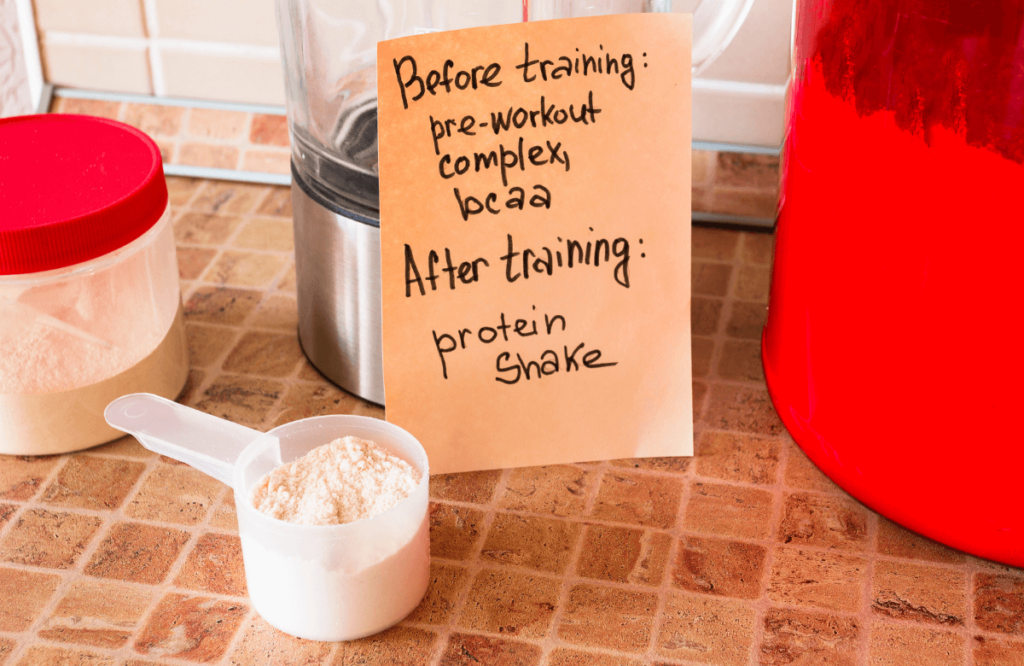
Frequently Asked Questions (FAQ)
Is It Good to Poop After Taking Pre-Workout?
Using the bathroom after taking a pre-workout is generally expected. Most products contain caffeine, vitamins, and other ingredients that can give you the urge to use the restroom. If you notice cramps, abdominal pain, vomiting, or diarrhea, stop taking the product immediately. It’s best to consult your doctor to see if you have any allergies or sensitivities.
Is It Normal to Get Diarrhea After Taking Pre-Workout?
Using the restroom is normal, but excessive diarrhea can be a sign of sensitivities, allergies, or other complications. Be sure to eat a balanced meal and drink plenty of water before taking your product. Adjust the dosage to see if that helps with any side effects. If issues persist, stop taking the product immediately and contact your doctor to see if you have any allergies or sensitivities.
Is It OK to Take Pre-Workout Everyday?
It’s best to consult with your doctor if you’re taking any medication or have health conditions before taking a daily supplement. That said, a safe, third-party tested, high-quality pre-workout is typically safe to take every day. It’s essential to manage the amount of caffeine and not exceed the recommended dosage guidelines.



